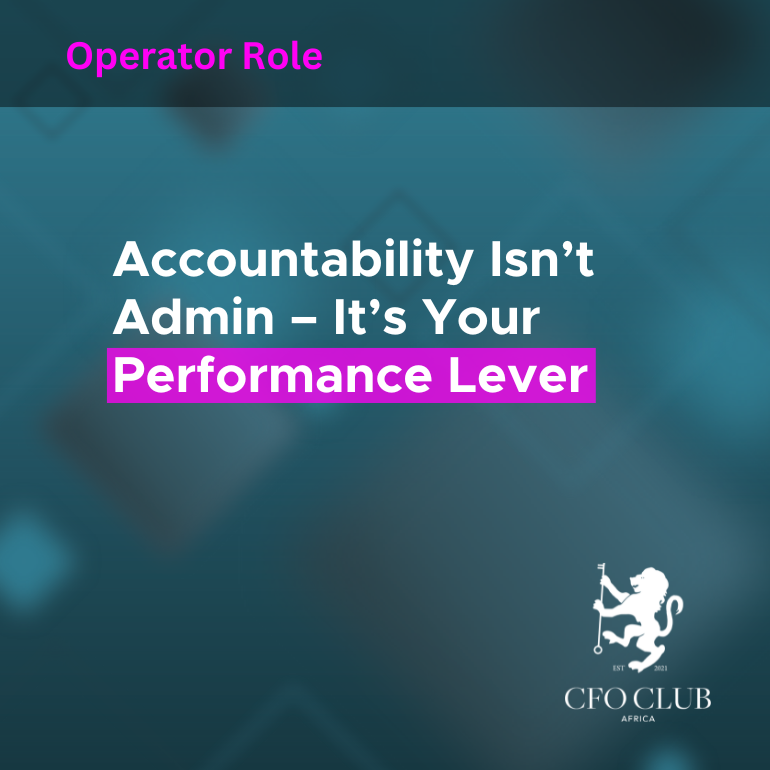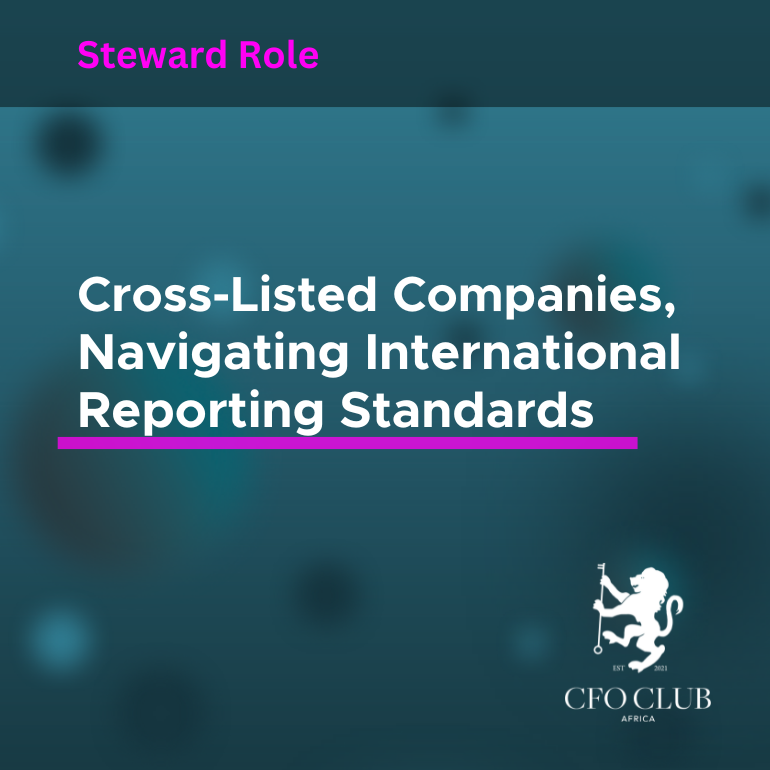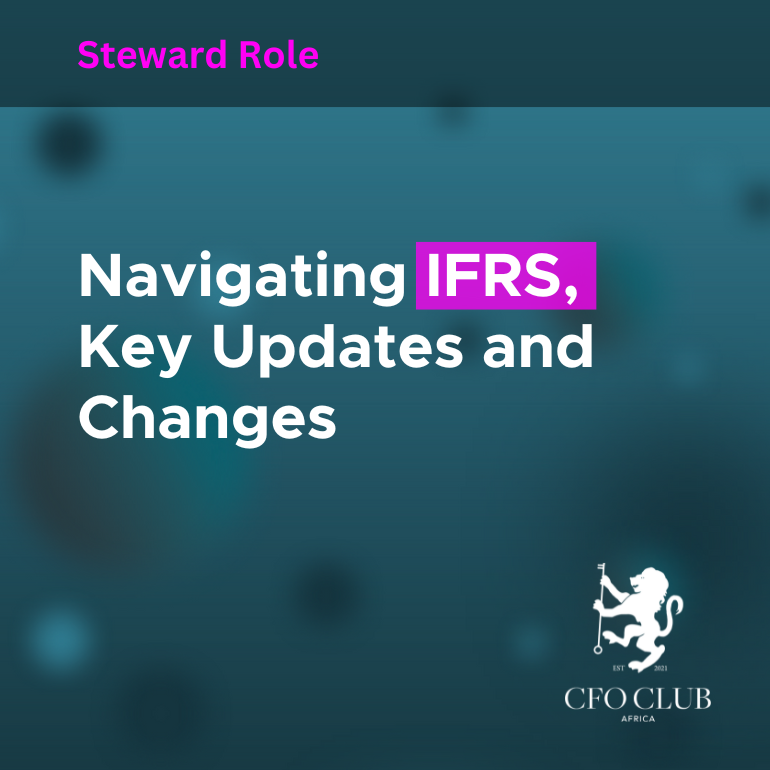Accountability Isn’t Admin – It’s Your Performance Lever
Accountability Isn’t Admin – It’s Your Performance Lever
For all the talk about AI-driven forecasting, real-time dashboards, and digitising the finance function, there remains one cornerstone of high-performing finance teams that no technology can replace: accountability.
Not accountability as a procedural requirement or something that shows up on a policy document. True accountability, the kind that transforms finance from a reporting function into a strategic powerhouse—is personal, cultural, and behavioural. It’s about creating an environment where financial professionals don’t just perform tasks but actively own the outcomes.
When accountability is embedded, the finance function becomes sharper, faster, and more trusted. Without it, even the most brilliant CFO will find themselves patching up avoidable errors, defending late reports, and wasting energy on workarounds.
Accountability: The Missing Ingredient in Many Finance Teams
At its most basic, accountability is about ownership. It means having someone who doesn’t just complete a task but stands behind it. Someone who knows the numbers inside out, can explain the movements, and understand what those numbers mean for the business.
It’s easy to think this is already happening. After all, most finance functions have policies, procedures, and deadlines. Reports get submitted. Reconciliations get done. But too often, it happens in a mechanical way—without the level of responsibility, curiosity, or forward-thinking mindset that creates real business value.
A finance team might meet its deadlines, but are the insights meaningful? Are variances explained, or merely noted? Are decisions challenged when forecasts don’t match operational realities, or is the budget treated as sacred regardless of what’s changing on the ground?
When accountability is lacking, you’ll see blame being passed from one department to the next. You’ll hear things like, “Ops didn’t send their numbers in time,” or “That’s not my line, I just posted what I was given.” You’ll spend far too much time reviewing work that should have been right the first time, and even more time fixing it under pressure.
High-performing finance teams don’t wait to be chased. They deliver because they see the bigger picture—and they care about it.
Accountability Is More Than Compliance
Finance professionals are trained to be cautious. Compliance is non-negotiable, of course. But accountability goes a step further. It requires that individuals not only follow the rules but internalise their importance and understand the downstream impact of their actions.
Take reporting deadlines as an example. Submitting reports on time is a compliance requirement. Submitting reports on time with clean data, sensible commentary, and clear recommendations—that’s accountability.
Similarly, preparing a budget isn’t just about compiling figures and applying inflation assumptions. Accountable finance professionals question the logic, sanity-check the drivers, and consider whether the plan makes sense in the wider business context. They’ll speak up when they see a mismatch between financial assumptions and operational intent, even if it’s uncomfortable to do so.
This kind of ownership doesn’t just reduce errors, it elevates the entire function.
Why CFOs Need to Champion Accountability
If accountability is to thrive, it must start at the top. The CFO sets the tone not just in strategy, but in culture. How mistakes are handled, how decisions are made, how feedback is given—all of these shape how teams understand their role and responsibility.
CFOs who model accountability—who own their missteps, acknowledge uncertainty, and expect rigour in all directions—create teams that do the same. Conversely, when senior leaders shift blame or avoid difficult conversations, it sends a message: performance matters less than politics.
But accountability isn’t just about culture, it’s a practical lever too. Teams that are accountable tend to deliver faster closes, more accurate forecasts, and fewer audit findings. They respond to operational teams with confidence and can support strategic decision-making without second-guessing their numbers.
They also attract and retain stronger talent. Finance professionals who take pride in their work want to be surrounded by others who do the same.
Moving from Activity to Impact
A common trap in finance is mistaking activity for effectiveness. Reports are produced. Packs are circulated. Meetings are held. But the real question is—what impact are these activities having?
Without accountability, financial reporting becomes a tick-box exercise. Forecasting becomes a game of optimism versus realism. Variance analysis becomes a copy-paste exercise, carried over month to month with little insight or challenge.
Accountable teams ask better questions. Why is revenue slipping in that region? Why are costs trending higher than planned? What assumptions need to be re-evaluated? They don’t stop at the numbers, they interpret them, challenge them, and use them to influence outcomes.
That’s when finance stops being a scorekeeper and becomes a strategic partner.
Breaking the Silence Around Weak Accountability
Let’s be honest—many CFOs know when accountability is lacking, but they tolerate it because addressing it feels time-consuming or politically risky. Perhaps it’s a long-serving team member whose quality has slipped, or a department that always submits late, or a reliance on one star performer who quietly picks up the slack.
But every time poor accountability is ignored, it compounds. Standards drop. High performers become frustrated. Errors increase. The function becomes reactive rather than proactive.
To build a truly accountable team, CFOs must be willing to reset expectations. That means clarifying roles, tightening ownership of reports and processes, and making it clear that “sort of done” isn’t good enough.
It also means celebrating those who get it right. When someone flags a data anomaly before it reaches the board pack, that’s not just doing their job—that’s protecting the business. Recognising those behaviours sets the standard.
Systems and Structure Are Not Enough
It’s tempting to believe that accountability can be embedded through structure alone—via new reporting lines, updated policies, or performance targets. This helps, but they’re not enough.
Real accountability is behavioural. It’s whether people feel trusted. Whether they know their voice matters. Whether they believe their work has meaning beyond the spreadsheet. Whether they’re allowed to make mistakes and learn from them—without fear or ego getting in the way.
Technology can support this, of course. Automated workflows, audit trails, and shared dashboards all create transparency. But they won’t create commitment. They won’t make someone stay late to fix a forecast or question a dodgy assumption unless the culture supports it.
The Bottom Line
In the end, accountability is not a cost, it’s a performance driver. A finance function that owns its work, its numbers, and its impact will always outperform one that merely complies.
For CFOs, embedding accountability is not about micromanagement or tougher rules. It’s about clarity, culture, and leadership. It’s about shifting the mindset from “I did my part” to “We got it right.” And in a world where finance is expected to do more—with less, and faster—there’s no greater advantage than a team that takes real responsibility for what it delivers. Because when accountability is real, performance follows.





